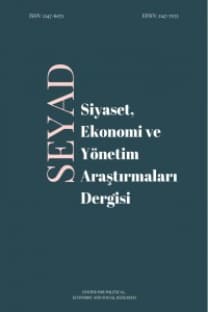Yeni Küresel Yönetişimde Esnek Diplomasinin Rolü: G20 Örneği
G20, Zirve Diplomasisi, BRICS
The Role of Flexible Diplomacy in New Global Governance: G20 Case
G20, Summit Diplomacy BRICS, MIKTA, Global Governance,
___
- Al, Arzu. “Küresel Ekonomik Yönetişimin Geleceği: Avro Krizi- AB – IMF Etkileşimi”. Emel Parlar Dal, Gonca Oğuz Gök, Tolga Sakman (Ed.), Küresel Yönetişim, Güvenlik ve Aktörler: 70. Yılında BM içinde. İstanbul: TASAM Yayınları, 2016, s. 447- 458.
- Arda, Mehmet. “Turkey – the Evolving Interface of international Relations and Domestic Politics”. South African Journal of International Affairs. 2015, Vol.
- No. 2, s. 203-226.
- Bruera, Hernán F. Gómez. “To be or not to be: Has Mexico got what it takes to be an emerging power?”. South African Journal of International Affairs. 2015, Vol. 22, No. 2, s.227-248.
- Carin, Barry, vd. “Making the G20 Summit Process Work: Some Proposals for Improving Effectiveness and Legitimacy”. CIGI. Waterloo, 2010.
- Chapnick, Adam. “The Middle Power”. Canadian Foreign Policy Journal, Vol 7, No.2, 1999, s.73-82.
- Cooper, Andrew .“The G20 as an Improvised Crisis Committee and/or a Contested ‘Steering Committee’ for the World”. International Affairs, 86: 3, 2010, s.741-757.
- Cooper, Andrew ve Mo, Jongryn. “Middle Power Leadership and the Evolution of the G20”. Global Summitry Journal. May 2013, s. 1-14.
- Cooper, Andrew ve Mo, Jongryn. “Middle Power Leadership and the Evolution of the G20”. Global Summitry Journal. May 2013, s. 1-14.
- Cooper, Andrew. “G-20 Middle Powers and Initiatives on Development”. Mo Jogryn (Ed.), MIKTA, Middle Powers, And New Global Dynamics of G20’s Evolving Agenda içinde. New York: Palgrave and Macmillan Publishing, 2015, s. 32-46.
- Global Governance The
- Çelik- Wiltse, Evren. “The G20 and Global Economic Governance during a Protracted Recession”. Perceptions, Winter 2013, Volume XVIII, Number 4, s.7-28.
- Çolakoğlu, Selçuk. “The Role of MIKTA in Global Governance: Assesments and Shorthcomings”. Korea Observer. Vol 47, No:2 (Summer 2016), s.267-290.
- Dinler, Zeynel. İktisada Giriş. 16. Basım. Bursa: Ekin Yayın Dağıtım, 2011.
- Duggan, Nial. “BRICS and the Evolution of a New Agenda Within Global Governance”. Mare Rewizorski (Ed.), The European Union and The BRICS Complex Relations in the Era of the
- Global Governence içinde. Springer Publishing, 2015, s. 11-25.
- Engin, Belma ve Baba, Gürol. “MIKTA: A Functioning Product of “New” Middle Power- ism?”. Uluslararası Hukuk ve Politika, Cilt: 11, Sayı: 42, 2015, s. 1- 41.
- G20 Information Centre. The Group of Twenty: A History. Western Cape, 18 Kasım 2007.
- Goldman Sachs. Beyond the BRICS: A Look at the N-11. Nisan 2007. https://www.imf.org/external/np/sec/pr/2009/pdf/g20_040209.pdf (04.12.2017).
- IMF, G20 London Summit, Leaders’ Statement. 2 April 2009.
- Kılıç, Büşra. “G-20 Orta Ölçekli Güçte Ülkeler (MIKTA) ile Türkiye’nin Kalkınma Bağlamında Karşılaştırmalı Analizi”, Yayınlanmamış Yüksek Lisans Tezi. İstanbul: Marmara Üniversitesi Sosyal Bilimler Enstitüsü, 2017.
- Kirchner, Stephen. “The G20 and Global Governance”. Cato Journal. Vol. 36, No. 3 (Fall 2016).
- Larionova, Marina. “Assessing G8 and G20 effectiveness in Global Governance So Far”. CIGI. Waterloo, 2012.
- Lipton, Merle. “Are the BRICS reformers, revolutionaries, or counter-revolutionaries?”. South African Journal of International Affairs, 24:1, s. 41-59.
- Manicom, James ve Reeves, Jeffrey. “Locatingg Middle Powers in International Theory and Power Transitions”. Bruce Gilley ve Andrew O’Neil and the Rise of China içinde. Georgetown: 44. Relations (Ed.).Middle Powers
- Georgetown Universtiy Press, 2014, s. 23
- Mehmetçik, Hakan. “Küresel Ekonomik Krizler ve Türkiye’nin G-20 Algısının Dönüşümü”. Arzu Al (Ed.). Uluslararası Politik Ekonomi Ekonomik İstanbul: Babıali Kültür Yayıncılık, 2016,s. 37-58.
- Krizler ve Türkiye içinde.
- OECD. Çeyrek Dönemlik Ulusal Hesapları. G20- Çeyrek Dönemlik GSYH Büyüme Oranları
- http://stats.oecd.org/index.aspx?queryid=33940# - .(04.12.2017).
- Öniş, Ziya. “The Age of Anxiety: The Crisis of Libeal Democracy in a Post- Hegemonic Global Order”. Italian Journal of International Affairs,2017,s.1-17.
- Rodrik, Dani. “Küresel Yönetişim Mümkün Müdür? Gerekli Midir?”, Yusuf Uslu (çev)., 21. Yüzyılda Sosyal Bilimler, Sayı 1, (Eylül-Ekim-Kasım 2012), ss. 21-40.
- Rosenau, James N. “Governance in the Twenty- first Century”. Global Governance. Vol. 1, No.1 (Winter 1995), s. 13-43.
- Tok, Evren. “Küresel Yönetişim ve G-20’nin Siyasal Ekonomisi”. Ülke Deneyimleri Işığında Caner Bakır Küresel Kriz ve Yeni Ekonomik Düzen. Fikret Şenses, Ziya (drl.). İstanbul: İletişim Yayınları, s.17-40. Öniş ve
- Turunç, Sencer. “G20 Gündeminde Yer Alan Kalkınma Konuları”. Maliye Bakanlığı Avrupa Birliği ve Dış İlişkiler Dairesi Başkanlığı Bilgi Notu. Ankara, 2015.
- Türkiye Cumhuriyeti Merkez Bankası. G20 Platformu ve 2015 Türkiye Dönem Başkanlığı Kitapçığı. Ankara, 2015.
- Ünay, Sadık ve Kayıkçı, Fazıl. “Çok Kutuplu Küresel Ekonomik Düzen ve BRICS: Kriz Sonrası ve Yeni Ekonomik Düzen. Fikret Şenses, Ziya Öniş ve İstanbul: Küresel Kriz Caner Bakır (drl.).
- ISSN: 2147-6071
- Yayın Aralığı: Yılda 2 Sayı
- Başlangıç: 2014
- Yayıncı: Politik Ekonomik ve Sosyal Araştırmalar Merkezi
Kariyerde Kuşak vs Toprak: Kariyer Algısında Doğulan Coğrafi Konum ve Kuşağın Etkisi
Türk Dış Politikası’nda Afrika Açılımı
Küresel Vergi Yönetimi: Yeni Ortak Hukuk
Eda Özdiler KÜÇÜK, Eşref KÜÇÜK
Hermeneutik, Postmodernizm ve İktisadi Yansımaları
Hülya UZUN, Ali Çağrı BURAN, Elif Tuba BEYDİLLİ
Facebook ve Twitter Kullanıcılarının Siyasal Katılım Eğilimlerinin İncelenmesi Üzerine Bir Araştırma
Kürşad ÖZKAYNAR, Remzi ALTUNIŞIK, Tarık YOLCU
Vergi İndirimlerinin Ekonomik ve Mali Etkileri: Son Dönem Türkiye Uygulamaları
İhsan Cemil DEMİR, Cem GÖKCE, İsmail CİĞERCİ
Küresel Krizin Bir Felsefesi Var mıdır? Kimler, Niçin Çıkarırlar? Makro Bir İnceleme
Hande Ulukapı YILMAZ, Abdullah YILMAZ
Kişilik, Karar Verme Tarzları ve İş Fikri Bulma Yöntemleri Arasındaki İlişki
İlter HELVACI, Mithat TURHAN, Onur KÖPRÜLÜ
Yeni Küresel Yönetişimde Esnek Diplomasinin Rolü: G20 Örneği
